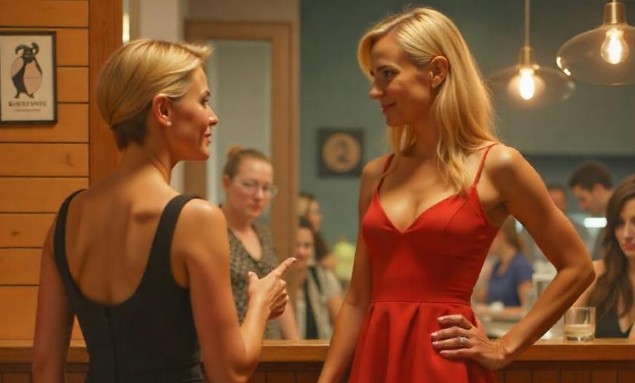Woman Who Ordered Me to Modify My Hairstyle and Work Attire at My Restaurant Was Actually My Brother’s Fiancée

I run a small, fancy bistro in downtown Portland, and it is my pride and joy. The dining room has warm wood tables, soft golden lights, and fresh flowers from a nearby farm on every surface. Regular guests come in so often that most of us greet each other by first name, and on Friday and Saturday nights our wait-list can stretch a full two weeks. I built this place from the ground up, so I work every job inside it. Some evenings I’m the host who smiles at the door; other times I hurry between tables with plates balanced on my arms. If the bar is too busy, I shake cocktails. If the kitchen is short-handed, I jump on the line and flip pans. Owning a restaurant is never slow, but I adore it, and nothing makes me happier than seeing every seat full and hearing that steady buzz of laughter and clinking glasses.
A few months back my older brother, Mike, called me from the East Coast with thrilling news. “I asked my girlfriend to marry me!” he shouted through the phone, so loud I held it away from my ear. Mike and I are close—same goofy sense of humor, same taste for hard work—so I nearly squealed. He had dated this woman for about a year, yet he’d shared only tiny details. He said she worked in fashion, that she was confident, that she had style. He never told me much more, but that was fine; I trusted his judgment. Then he surprised me. “We’re coming to Portland this weekend. I want you two to meet. We’ll have dinner at your place.”
My heart swelled. Meeting the future sister-in-law felt huge, and doing it in my restaurant felt like showing her the most important piece of my life. I booked the best corner table, made sure the staff knew to treat them like royalty, and planned to take the evening off so I could sit and chat without distraction.
Of course, restaurants have minds of their own. On the night they were due, every seat was booked. Around four o’clock my hostess called; she had terrible food poisoning and could not stand up, let alone greet guests. I slipped into a crisp black blouse, black slacks, and tied my curls in a high bun. Professional, tidy, ready. I would host until my brother arrived.
Mike texted at six-fifteen: “Running late—client call won’t end. She’ll show first.” No problem. I pictured opening a nice white wine for his fiancée, setting down one of our cheese boards, and passing time with friendly talk.
At six-forty sharp, the front door swung open. In glided a tall blonde wearing a tight red designer dress and spike heels that clicked on the polished floor like a metronome. She looked around with an assessing stare, as if the room were a prize to judge. I flashed my warm host smile and opened the reservation list on the tablet. “Welcome! May I have the name on the booking?”
She hardly looked at my face. Her gaze drifted over my outfit—black on black, neat, nothing flashy—then up to my bun. Her upper lip twitched like she had tasted something sour. “Wait…do you work here?” she asked, voice coated in mild disgust.
“Yes, I’m the owner and host tonight. How can I help you?”
She frowned. “Well, not to be rude, but you’re dressed a little…fancy for waitstaff, aren’t you? Could you wear something simpler? And that hairstyle—so high and tidy—it’s a bit much. My fiancé will be here soon, and I’d prefer no distractions. This evening is meant to be about me.”
I blinked, sure I’d misheard. “I’m sorry?”
She sighed, slow and exaggerated. “Could someone else handle our table? A manager, maybe? Someone less…attention-grabbing. Image is important to me, and I don’t want the focus stolen.”
The slap of her arrogance stung. I had spent years creating a place where every worker felt respected, where guests felt cherished, and here was someone acting like kindness and dignity were optional extras. But I stayed calm. Experience tells me the best way to handle rudeness is to let it roll off and respond with measured grace. “Absolutely,” I said, voice smooth as honey. “I’ll fetch the manager at once.”
She flashed a triumphant grin, as if she’d won some secret contest. “Perfect. And please make sure your replacement looks more…appropriate.”
“Of course,” I said, keeping my expression pleasant. “You’ll get exactly what you deserve.”
I stepped into the back office, shut the door, and let out one long breath. My hands shook from anger and pure disbelief. After a count to ten, I grabbed a stack of my business cards, straightened my shoulders, and marched back toward the dining room. Oh, this would be interesting.
The blonde—my brother’s mysterious fiancée, though I did not know that yet—stood near the host stand, scrolling on her phone. I approached with the calm I reserve for stormy nights. “Hello again. Just checking—are you comfortable while you wait?”
Her head jerked up; annoyance flashed across her face. “You again? I asked for the manager. Are you hard of hearing?”
I placed a business card on the podium right in front of her polished nails. “I am the manager,” I said, voice smooth as satin. “And the owner.”
She stared at the card as though the letters might rearrange themselves. Then she glanced around the room like hidden cameras would pop out and yell “Surprise!” Her mouth opened, closed, opened. “This can’t be real,” she whispered.
Just then Mike hurried through the entrance, face bright. He spotted me and came straight over, lifting me in a huge bear hug. “Sis! Sorry I’m late. That conference call would not end.” He set me down, then turned to the woman beside me. “Ashley, meet Jill, my baby sister—the genius who runs this amazing place.”
Ashley, frozen, turned almost gray. “Your sister?” she squeaked.
Mike draped an arm around my shoulders. “Yep, just us two siblings. She’s been telling me to open a second location closer to me, but I’m lazy,” he joked.
Ashley clutched the business card like it might bite her. “So…this is really your restaurant?” she asked me, voice no louder than a mouse.
“All mine,” I answered, with a polite nod. “The stove, the bar, the floor, even the playlist.”
Mike looked from her to me, confusion growing. “Is something wrong?”
I smiled, sweet but sharp. “Your fiancée requested I change my hair and clothing—and that someone less ‘put-together’ serve your table. She thought my appearance might distract you.” I gave him a look that said, Can you believe this?
Mike’s jaw nearly hit the hardwood. “She told you that?” He turned to Ashley. “You said that to my sister?”
Ashley’s voice trembled. “Mike, I thought she was just a waitress—”
“And that makes it okay?” I cut in gently but firmly. “You judged someone’s worth by a job title you guessed, then tried to control how they look.”
Ashley flinched. “I…I didn’t mean—”
Mike held up a hand. “Ash, this is not acceptable.”
Silence fell. Diners nearby pretended not to notice but leaned ever so slightly to catch our words. I raised a calming palm toward my brother. “We can talk later. Dinner first?” I asked.
We showed them to the reserved table. I poured wine myself, then handed the table off to Sarah, my head server, who knew the situation and kept service flawless.
Throughout dinner Mike and Ashley spoke in low tones. I focused on the rest of the dining room, greeting regulars, checking on plates, making sure water glasses stayed full. Yet I could feel Ashley’s eyes follow me whenever I passed. Guilt, worry, embarrassment—each flashed across her face like a billboard.
Halfway through their entrée, Mike stepped outside for a work call. Moments later Ashley rose and approached me near the bar. Gone was the arrogant posture; her shoulders drooped. “Can we talk?” she asked quietly.
I nodded and led her toward a side hallway by the coat rack, away from prying ears.
She took a shaky breath. “I’m sorry,” she said. “What I did was awful. I have…baggage. My last boyfriend cheated on me with a waitress at his regular restaurant. Since then I panic when I feel…well, threatened.”
I listened, arms folded but expression softening. “That betrayal must have hurt,” I said, choosing simple, gentle words. “But pain does not give permission to hurt others.”
She bobbed her head, tears shining. “I know. You built something amazing here, and I disrespected you in your own house. Can you forgive me?”
I let her apology hang in the air a moment. “Forgiveness is possible,” I said, “but trust is something we build step by step. I’ll treat you with respect for my brother’s sake. In return, I hope you’ll do the same for the people who serve you—no matter what they wear or where they work.”
Ashley wiped her eyes. “Yes. I will.”
We returned to the dining room. The rest of the night moved smoothly. Mike ended his call, dessert arrived, laughter bubbled at their table. They left generous tips for every staff member.
Weeks rolled by. Mike and Ashley visited again, and again, each time more relaxed. Ashley asked servers about their families, complimented cooks on flavors, thanked dishwashers. I saw the change; it was real.
Eventually the wedding invitations arrived—cream card stock, gold script. The ceremony was small, lovely. I stood beside Mike as best woman, watching him tear up when Ashley walked down the aisle. She wore happiness like sunlight. After they exchanged vows, she hugged me. “Thank you for giving me a second chance,” she whispered.
I squeezed her back. “Congratulations, sister-in-law,” I said, and meant it.
Now, whenever I think about that first night, I remember the sting of her words, but I also remember how people can grow. The rude stranger who marched into my restaurant demanding I dress down so she could feel special is now part of my family. She learned that respect has nothing to do with uniforms or hairstyles. And I learned that patience—and a stack of business cards—can turn an ugly moment into an unexpected beginning.
Since then, whenever a guest treats a server poorly, I step in with calm professionalism and a gentle reminder that every person in the room deserves courtesy. Sometimes I tell them a short version of the story: “Someone once thought my bun was too fancy. She’s family now.” It usually earns a laugh and breaks the tension.
Owning a bistro means long hours, endless challenges, and the occasional rude surprise. Yet it also means witnessing tiny miracles—two strangers meeting on a first date, a shy kid trying new food, or a difficult customer learning humility. My restaurant is more than tables and chairs; it’s a living story, and every night writes a new page.
So if you ever walk through our doors, look for the woman in black slacks and a high bun greeting guests with a smile. That’s me, Jill—the hostess, bartender, cook, owner, and sister who discovered that kindness, mixed with a little firmness, can change more than just a dinner service. It can change hearts—sometimes, even your own.



